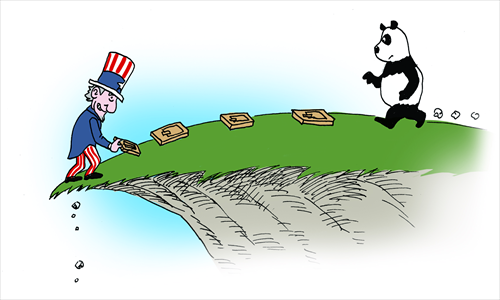US petulance toward Belt, Road self-defeating

Illustration: Liu Rui/GT
The recent round of China-US Strategic and Economic Dialogue followed by the September state visit to Washington of Chinese President Xi Jinping provided the Obama administration with an opportunity to amend its peculiar position toward China's "One Belt, One Road" (OBOR) initiative.
Since the 2013 unveiling of the Silk Road economic belt and the 21st Century Maritime Silk Road, traversing the Eurasian landmass and the surrounding waterways, China has put meat on the bones of the project, announcing major energy and transportation infrastructure initiatives in Southeast Asia, Central Asia and South Asia, including a recent $46 billion pledge to Pakistan, and it plans to do the same in the Persian Gulf, Eastern Europe and the Eastern Mediterranean.
To fund OBOR projects it has created dedicated financial institutions like the Silk Road Fund and the Asian Infrastructure Investment Bank (AIIB). It even announced a stock index to track the performance of shares of companies which have business related to the initiative.
To all of this Washington responded with roaring silence. US officials refrain from commenting on the initiative in public or even mentioning it by name. Instead, Washington exercises soft power tactics intended to disrupt China's plan, like the futile opposition to the AIIB and the efforts within the IMF to block the yuan from attaining the status of reserve currency. The excuse is always the same: China is not responsible enough, not transparent enough and not accountable enough to lead the international development agenda.
But the antagonism seems to be driven more by a not-made-here sentiment than by a logical and constructive geopolitical rationale. Further, snubbing what could be the largest and most comprehensive development project in history, with the potential of enabling hundreds of millions of people to lift themselves from poverty at a time when Asia faces a shortfall of hundreds of billions of dollars of infrastructure investment, is morally objectionable. It is also self-defeating as it denies American investors the benefits of private investment in Asian infrastructure.
But the bigger problem is that US frosty attitude toward the OBOR initiative raises the risk of great power confrontation down the road. Historically, game-changing transnational infrastructure projects have typically evoked suspicion and hostility among powers. In the late 19th century Britain's Cape Town-to-Cairo Railway project conflicted with the French-planned East-West Railway, almost leading to an Anglo-French war in Africa.
The Russo-Japanese War of 1905 was precipitated, in part, by the Japanese determination to strike before the Trans-Siberian Railroad, which would considerably strengthen Russia's hold in East Asia, could be completed. Imperial Germany's scheme to build the Berlin-Baghdad Railway to solidify its leverage over the crumbling Ottoman Empire contributed to the outbreak of WWI.
Today, it is no longer railways that shape relations among nations, but oil and gas pipelines, LNG terminals, high voltage power lines, and fiber optics lines. Without active US participation in OBOR projects, China's pocket book diplomacy will draw the contour lines of the geopolitical map and history might repeat itself.
To reclaim its vital role in shaping Eurasia's regional development and to avoid sinking into great power rivalry the US should seek ways to actively participate in it.
But what role can it play?
First, it should seek to inject its own comparative advantages to the plan. With superior force projection, homeland security and cyber defense capabilities, the US can play a role in protecting critical infrastructure along the OBOR corridors - many of them traverse tumultuous zones. China may build it; the US will protect it.
Additionally, US technology, engineering and construction companies participating in OBOR can offer best practices and high quality and safety standards. Finally, the US should use its participation in OBOR as a way to promote from within China's adherence to international labor, environmental and corporate standards.
But for all of this to happen, Washington should first decide to play a more constructive role in the OBOR architecture. The OBOR initiative is China's first real attempt to reshape the international order and it has become the hallmark of the Xi era. To be sure, it may greatly benefit China. But what strengthens China does not necessarily weaken the US. Sulking on the sidelines while China places steel on the ground certainly does.
The author is co-director of the Institute for the Analysis of Global Security and co-chairman of the Global Forum on Energy Security and Senior Adviser to the United States Energy Security Council. opinion@globaltimes.com.cn